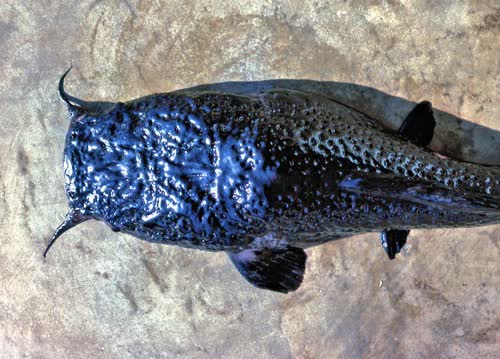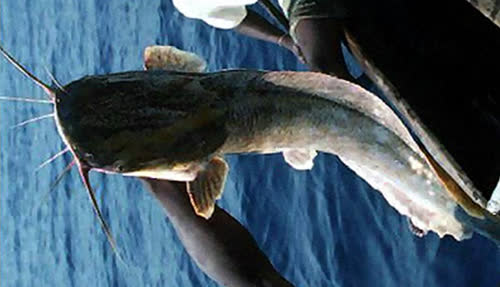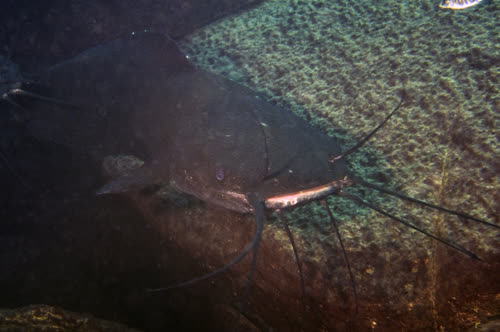"One of Lake Malawi's rarest catfishes, and surely the weirdest: Bathyclarias foveolatus. I caught this one with McKaye and Kocher at Nkhata Bay in 1980. It was alive when I photographed it, and is now in the Smithsonian (USNM 265800). So far as I can determine, it is the only specimen collected since the original 3 type specimens (in the British Museum) that Peter Jackson (1955) used to describe the species. The bizarre pockmarkings all over the head and body (foveolatus means pitted) remind the lakeshore fishermen of smallpox, and Jackson states that many Africans refuse to eat it, fearing that it will give them smallpox.
This species is sometimes mistakenly classified in the genus Dinotopterus but that is based on an error in Ferraris's 2007 catfish checklist; Dinotopterus occurs only in Lake Tanganyika." - Michael K. Oliver.
"I caught a few in the trawl. Greenwood switched it to Dinotopterus in 1961. I argued with him that it was impossible as the characters separating them from Clarias are adaptations to lakes and there were no lake connections between Tanganyika and Malawi so they had to have evolved separately in the same direction. The error was corrected in Anseaume, L. and G. G. Teugels 1999 On the rehabilitation of the clariid catfish genus Bathyclarias endemic to the east African rift Lake Malawi. Journal of Fish Biology v. 55: 405-419.
They seem to be only in the north of the lake in deeper water than you would normally trawl. There's another undescribed one up there with an eel-like body. I had two specimens but my drum got 'lost' when Mapila was in charge in Monkey Bay. He also threw out the whole collection of Rhamphochromis made by Digby and Peter Reinthal to use the drum in his garden.
Nick Willoughby started to attempt to revise the Bathyclarias when he was in Nkhotakota. He said there were also specimens that matched all the B. foveolatus morphometrics but had smooth skin. Someone needs to get up there with the Ndunduma for a few weeks with several drums of formalin and lots of DNA vials, and get sponsorship to ship a huge collection to a museum for a PhD student to sort them out." - Denis Tweedle FB Convo, Nov 2019.


